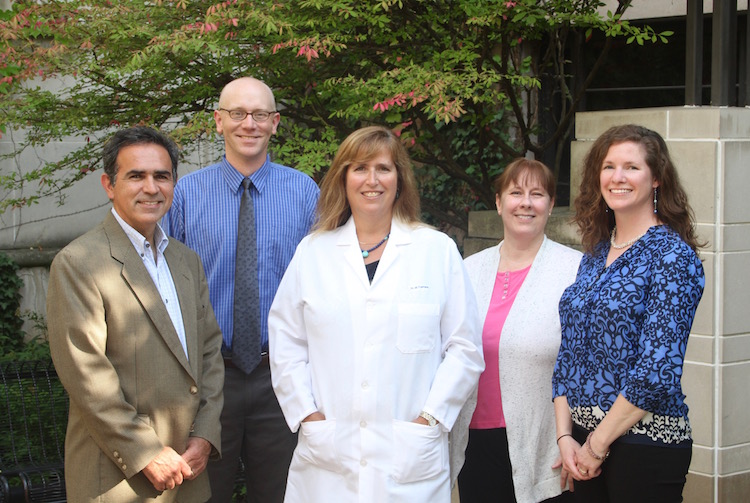Two major NIH grants to further research into childhood caries4 min read
Dr. Margherita Fontana will lead researchers from U-M, other universities
Ann Arbor, Mich., Sept. 22, 2017 -– Two grants totaling $18.3 million from the National Institutes of Health will allow a School of Dentistry professor to expand research into predicting caries risk in young children and assessing the efficacy of a new treatment.

Dr. Margherita Fontana, a professor in the Department of Cariology, Restorative Sciences and Endodontics, is the principal investigator for two teams of researchers from U-M and several other universities.
The first study, “Predicting Caries Risk in Underserved Children, from Toddlers to the School-Age Years, in Primary Healthcare Settings,” expands the age range for assessing which children are at risk of developing caries, more commonly known as cavities. A related previous study focused on children up to age 4; the new grant will continue that research for children up to age 8.
Dental caries, one of the most common chronic diseases of childhood, is a largely preventable disease, yet approximately 23 percent of U.S. children ages 2-5 have cavities. The percentage is even higher – 56 percent – among children age 6-8. This study will focus on children in low socioeconomic and minority population groups where the disparity in prevalence of caries and in access to treatment is greater than in the general population.
The study will develop a practical and easily-scored caries risk tool for use in primary medical healthcare settings to identify children at high risk of caries, then follow their progress over time up to age 8. This approach is significant, Fontana said, because it will allow cost-effective preventive and referral strategies to be developed and used in interprofessional settings to prevent caries development from the toddler to the school-age years. “This will have immediate broad impact and influence on existing and-or new policies and programs to be delivered by non-dental professionals in medical settings and other non-healthcare settings (for example, in schools), as well as by dental professionals in dental healthcare settings,” according to the interprofessional project’s summary.
The grant, from the National Institute of Dental and Craniofacial Research (NIDCR), provides $8.7 million over five years.
Fontana’s dental school colleagues Emily Yanca, the project and data manager, and Dr. Erika Benavides, a specialist in radiology, are team members, along with researchers from the University of Iowa, Indiana University, Duke University, Nationwide Children’s Hospital in Ohio, George Mason University and the University of North Carolina.
The second new grant, also from the NIDCR, provides $9.6 million over four years to fund a Phase III randomized clinical trial to test the effectiveness of silver diamine fluoride (SDF) in arresting caries in children. SDF was approved for treatment of dental hypersensitivity in the U.S. in 2014 after previously being used in numerous other countries. The study will provide the necessary data for obtaining a cavity arrest drug claim in the U.S. It will closely follow 1,060 children, ages 2-5, in preschool programs such as Head Start during a school year.
The significance of this trial, Fontana said, is that SDF is a non-invasive, inexpensive, and simple alternative for treating cavities in children, particularly those with limited access to regular dental care. Researchers will test whether SDF can “profoundly improve oral health by arresting lesions, reducing pain, improving quality of life, and significantly reducing costs, all contributing to substantial reductions in disparities in caries.”
Other U-M researchers and consultants on the project include Emily Yanca, Dr. Carlos Gonzalez-Cabezas, Dr. James Boynton, Dr. Livia Tenuta, Dr. Darya Dabiri, Dr. Peter Milgrom, Dr. Michael Manz, Susan Flannagan, and Dr. Marcy Borofsky, with others joining in coming months. Also part of the study are researchers from the University of Iowa, New York University, Indiana University, University of Otago in New Zealand, University of Hong Kong and University of Baltimore.
Fontana is recognized internationally as a leading scientist in the field of cariology, the study of tooth decay and how cavities develop, and has an extensive clinical research background in childhood caries management. Her work was recognized in 2012 at the White House by President Barack Obama with the Presidential Early Career Award for Scientists and Engineers.
###
The University of Michigan School of Dentistry is one of the nation’s leading dental schools engaged in oral health care education, research, patient care and community service. General dental care clinics and specialty clinics providing advanced treatment enable the school to offer dental services and programs to patients throughout Michigan. Classroom and clinic instruction prepare future dentists, dental specialists, and dental hygienists for practice in private offices, hospitals, academia and public agencies. Research seeks to discover and apply new knowledge that can help patients worldwide. For more information about the School of Dentistry, visit us on the Web at: www.dent.umich.edu.
Contact: Lynn Monson, associate director of communications, at [email protected], or (734) 615-1971.
